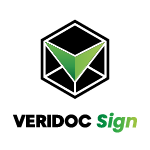Description

MemberCheck

VeriDoc Sign
Comprehensive Overview: MemberCheck vs VeriDoc Sign
MemberCheck and VeriDoc Sign are two distinct platforms, each with specific primary functions, target markets, and unique features. Here's a detailed overview of both:
MemberCheck
a) Primary Functions and Target Markets
- Primary Functions: MemberCheck is primarily a compliance and risk management solution designed to assist businesses in adhering to Anti-Money Laundering (AML) and Counter-Terrorism Financing (CTF) regulations. Its core functions include customer identity verification, ongoing monitoring, and risk assessment to ensure organizations meet regulatory requirements.
- Target Markets: The platform primarily targets financial institutions, insurance companies, legal firms, and other organizations that require thorough compliance checks as part of their operations. Businesses operating in highly regulated industries or with stringent compliance needs are the key clientele.
b) Market Share and User Base
- As a specialized compliance tool, MemberCheck's market share is relatively niche, focusing on organizations dealing with stringent regulatory obligations. Its user base, while specific, includes various financial and legal institutions that prioritize compliance and risk management.
c) Key Differentiating Factors
- Compliance Focus: MemberCheck stands out for its deep integration of global AML and CTF compliance checks, providing detailed risk assessments and audit trails.
- Advanced Monitoring: It offers ongoing monitoring capabilities that continuously check customer information against updated sanction and watch lists, which is crucial for remaining compliant over time.
VeriDoc Sign
a) Primary Functions and Target Markets
- Primary Functions: VeriDoc Sign is an e-signature platform offering digital signing solutions supported by blockchain technology. Its primary functions include secure document signing, verification, and storage.
- Target Markets: Target markets for VeriDoc Sign include businesses of all sizes across various sectors that require reliable and secure methods for document signing and management. This includes real estate firms, healthcare providers, legal services, and more.
b) Market Share and User Base
- VeriDoc Sign competes in the broader digital signature market, which includes major players like DocuSign and Adobe Sign. Its blockchain feature provides it a niche, growing segment of users interested in enhanced security and verification features. The overall user base would encompass businesses prioritizing security in digital document handling.
c) Key Differentiating Factors
- Blockchain Integration: The use of blockchain technology to ensure the immutability and verifiability of signed documents is a key differentiator, appealing to users requiring high security and trustworthiness.
- Security: Offers an enhanced level of security through blockchain verification, reducing the risk of document tampering or fraud.
Comparison
- Market Focus: MemberCheck is compliance-oriented with a focus on risk management for regulated industries, whereas VeriDoc Sign targets a broader range of sectors with its focus on secure document transactions.
- Technological Edge: MemberCheck emphasizes regulatory compliance, while VeriDoc Sign leverages blockchain for document security, each catering to specific needs within their respective domains.
- User Demographics: Members and user bases differ due to the nature of their services—MemberCheck appeals to compliance officers and legal teams, while VeriDoc Sign attracts sectors in need of digital transformation in document management.
In summary, while MemberCheck and VeriDoc Sign serve different core functions and markets, their success is driven by their specialized features—compliance management for MemberCheck and secure document signing for VeriDoc Sign, with blockchain as an innovative addition. Both platforms carve out their own niches within their respective markets, representing tailored solutions for specialized business needs.
Contact Info

Year founded :
2007
+61294535466
Not Available
Australia
http://www.linkedin.com/company/membercheck

Year founded :
Not Available
+61 7 3112 8080
Not Available
Australia
http://www.linkedin.com/company/veridoc-sign
Feature Similarity Breakdown: MemberCheck, VeriDoc Sign
When analyzing MemberCheck and VeriDoc Sign, both products are part of the broader regulatory compliance and document management ecosystem. Here's a breakdown of their feature similarity:
a) Core Features in Common:
-
Identity Verification: Both platforms offer some form of identity verification. MemberCheck focuses on AML (Anti-Money Laundering) and CTF (Counter-Terrorism Financing) checks, which may include digital identity verification. VeriDoc Sign might use similar identity verification to ensure the legitimacy of signatories.
-
Compliance Management: Each service aids organizations in maintaining compliance. MemberCheck provides comprehensive AML/CTF compliance solutions, while VeriDoc Sign ensures that electronic signatures meet legal standards.
-
Secure Data Handling: Security is paramount in both products, with encryption and secure data storage playing a key role to protect sensitive information.
-
User Management: Both platforms likely offer roles and permissions management to allow for various users and access levels, ensuring that sensitive actions can only be executed by authorized personnel.
b) User Interface Comparison:
-
MemberCheck: The UI of MemberCheck is probably designed with compliance officers and risk managers in mind, focusing on data presentation, analytics, and reporting. It likely includes dashboards that allow users to oversee potential risks and compliance statuses in real-time.
-
VeriDoc Sign: Being a document signing platform, its interface is likely optimized for ease of use and speed. It likely features straightforward navigation for uploading, signing, and sending documents. The UI may emphasize usability for various stakeholder interactions.
c) Unique Features:
-
MemberCheck:
- Sanction Screening and PEP Checks: A hallmark of MemberCheck is its focus on AML/CTF, offering features such as sanction list screening and Politically Exposed Person (PEP) checks, which are vital for financial institutions and businesses needing to stay compliant with global financial regulations.
- Risk Assessment Tools: MemberCheck might offer specific tools for assessing and mitigating financial crime risk, which is less likely to be a focus for a document signing platform.
-
VeriDoc Sign:
- Blockchain Technology: VeriDoc Sign may utilize blockchain technology to create an immutable record of the signing process, enhancing security and offering a clear audit trail that goes beyond standard digital signature solutions.
- Integration Capabilities: VeriDoc Sign might offer more in terms of integration with various document management systems and software suites, providing flexible options for businesses needing to incorporate signing workflows into their existing processes.
In summary, while both MemberCheck and VeriDoc Sign share some overlapping features essential for compliance and security, each has distinct offerings aligned with their specific purposes—regulatory compliance and secure document signing, respectively.
Features

Not Available

Not Available
Best Fit Use Cases: MemberCheck, VeriDoc Sign
a) Best Fit Use Cases for MemberCheck:
MemberCheck: MemberCheck is primarily designed for businesses and projects that need comprehensive compliance solutions related to anti-money laundering (AML), counter-terrorism financing (CTF), and Know Your Customer (KYC) requirements. It is best suited for:
-
Financial Institutions: Banks, credit unions, and investment firms that require stringent AML/CTF compliance and customer verification processes.
-
Insurance Companies: Organizations that need to verify the identities of policyholders and claimants to prevent fraud and ensure compliance with regulatory standards.
-
Cryptocurrency Exchanges: Platforms needing robust KYC and AML checks to meet regulatory requirements and ensure the integrity and safety of transactions.
-
Legal and Accounting Firms: Companies offering financial advisory services that require thorough background checks and compliance verification for clients.
-
Gaming and Gambling Sites: Online casinos and betting platforms that have regulatory obligations to verify the identities of users and prevent money laundering.
Cuisine/Country Specific Consultation Services: Projects where understanding the regional regulatory requirements is crucial for establishing compliance in different jurisdictions.
b) Best Fit Use Cases for VeriDoc Sign:
VeriDoc Sign: VeriDoc Sign is designed for scenarios where businesses and individuals need secure, efficient, and verifiable digital document signing. The preferred use cases include:
-
Real Estate: For transactions and agreements where parties need to sign documents digitally with assurance of their authenticity.
-
Legal Firms: To facilitate the secure signing and verification of contracts, legal documents, and affidavits.
-
Healthcare: For managing patient consent forms, medical records, and ensuring compliance with privacy regulations.
-
Government Agencies: For secure signing and verification of official documents, permits, and licenses.
-
Human Resources: To streamline the onboarding process by facilitating the digital signing of employment contracts and policy acknowledgments.
-
E-commerce: For vendors and customers to sign agreements and contracts relating to services or product offerings.
d) Catering to Different Industry Verticals or Company Sizes:
MemberCheck:
- Industry Verticals: It is oriented towards industries with heavy regulatory burdens, such as finance, real estate, insurance, and cryptocurrency platforms.
- Company Sizes: MemberCheck serves both large enterprises with significant compliance demands and smaller businesses that seek an affordable, scalable compliance solution.
MemberCheck is particularly valuable for businesses that prioritize risk management and need to adhere to specific regulatory standards regardless of their size.
VeriDoc Sign:
- Industry Verticals: VeriDoc Sign caters to a broad range of industries, including legal, healthcare, real estate, government, and any other sector that requires secure and efficient digital document management.
- Company Sizes: It is suitable for small businesses needing cost-effective signing solutions up to large enterprises that require integration with complex IT systems for mass document management and signing.
VeriDoc Sign is ideal for businesses looking for flexibility and security in digital transactions, catering to a wide spectrum of document-signing needs across multiple industries and sizes.
Pricing

Pricing Not Available

Pricing Not Available
Metrics History
Metrics History
Comparing teamSize across companies
Conclusion & Final Verdict: MemberCheck vs VeriDoc Sign
To provide a comprehensive conclusion and final verdict on MemberCheck and VeriDoc Sign, let's address each aspect of the comparison:
A) Best Overall Value
MemberCheck and VeriDoc Sign serve different primary functions within the identity verification and document signing space, respectively. The best overall value will depend on the specific needs of the user.
-
MemberCheck offers the best value for organizations that prioritize comprehensive identity verification and risk management solutions. It is especially beneficial for industries that require stringent compliance measures, such as finance and healthcare.
-
VeriDoc Sign provides excellent value for businesses and individuals who require reliable and secure electronic document signing solutions. It is user-friendly and may be more cost-effective for small to medium-sized enterprises looking to digitize their paperwork processes.
B) Pros and Cons
MemberCheck:
-
Pros:
- Comprehensive identity verification and AML (Anti-Money Laundering) compliance features.
- Robust risk management tools and reporting capabilities.
- Ideal for regulated industries that require detailed compliance checks.
-
Cons:
- Can be resource-intensive in terms of cost and time, especially for smaller organizations.
- May offer more features than necessary for businesses not focused on compliance.
VeriDoc Sign:
-
Pros:
- Simplifies the document signing process with a user-friendly interface.
- Enhances security and authenticity of documents through blockchain technology (if applicable).
- Suitable for various sectors, including legal, healthcare, and real estate.
-
Cons:
- Limited in terms of identity verification and compliance features compared to MemberCheck.
- May not fulfill the needs of organizations looking for advanced ID verification beyond document signing.
C) Recommendations for Users
-
Assess Your Needs:
- If your primary concern is compliance and detailed identity verification, especially in high-risk industries, MemberCheck would be the more suitable choice.
- If your main focus is on digital transformation and efficient document signing, VeriDoc Sign provides a streamlined solution.
-
Consider Integration and Scalability:
- For businesses planning to scale and integrate with other systems, evaluate the integration capabilities of both solutions in relation to your existing infrastructure.
-
Evaluate Budget Constraints:
- Consider the cost-benefit ratio and how each solution fits into your budget while meeting your specific requirements.
-
Trial and Feedback:
- Explore any available trials or demos to better understand the user experience and gather feedback from teams who will use the software regularly.
In conclusion, the decision between MemberCheck and VeriDoc Sign should be guided by the specific needs of your organization. MemberCheck is ideal for those needing robust identity verification and compliance solutions, while VeriDoc Sign is best for efficient and secure electronic document management. Users should evaluate the strengths of each product in relation to their operational requirements and compliance needs to make an informed decision.




